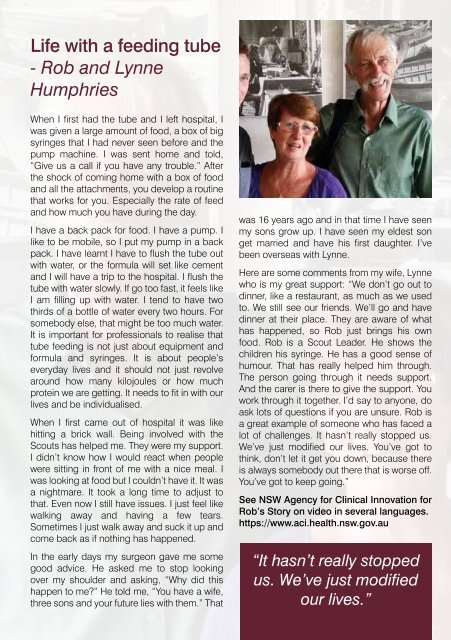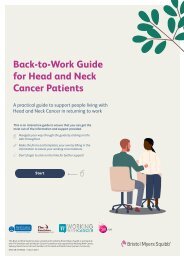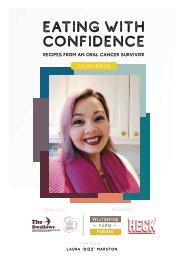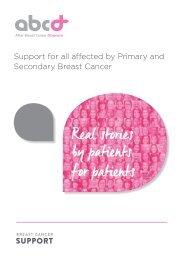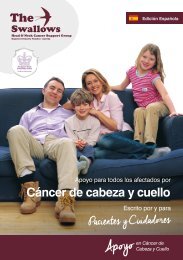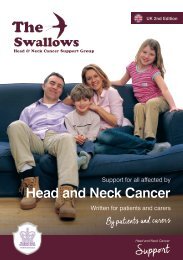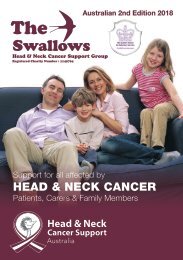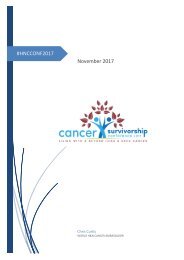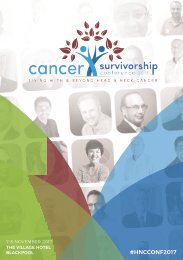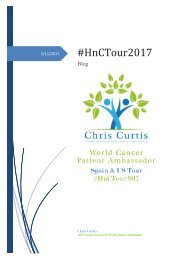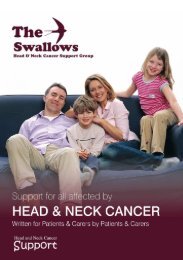The Swallows Australian Edition Magazine
Create successful ePaper yourself
Turn your PDF publications into a flip-book with our unique Google optimized e-Paper software.
Life with a feeding tube<br />
- Rob and Lynne<br />
Humphries<br />
When I first had the tube and I left hospital, I<br />
was given a large amount of food, a box of big<br />
syringes that I had never seen before and the<br />
pump machine. I was sent home and told,<br />
“Give us a call if you have any trouble.” After<br />
the shock of coming home with a box of food<br />
and all the attachments, you develop a routine<br />
that works for you. Especially the rate of feed<br />
and how much you have during the day.<br />
I have a back pack for food. I have a pump. I<br />
like to be mobile, so I put my pump in a back<br />
pack. I have learnt I have to flush the tube out<br />
with water, or the formula will set like cement<br />
and I will have a trip to the hospital. I flush the<br />
tube with water slowly. If go too fast, it feels like<br />
I am filling up with water. I tend to have two<br />
thirds of a bottle of water every two hours. For<br />
somebody else, that might be too much water.<br />
It is important for professionals to realise that<br />
tube feeding is not just about equipment and<br />
formula and syringes. It is about people’s<br />
everyday lives and it should not just revolve<br />
around how many kilojoules or how much<br />
protein we are getting. It needs to fit in with our<br />
lives and be individualised.<br />
When I first came out of hospital it was like<br />
hitting a brick wall. Being involved with the<br />
Scouts has helped me. <strong>The</strong>y were my support.<br />
I didn’t know how I would react when people<br />
were sitting in front of me with a nice meal. I<br />
was looking at food but I couldn’t have it. It was<br />
a nightmare. It took a long time to adjust to<br />
that. Even now I still have issues. I just feel like<br />
walking away and having a few tears.<br />
Sometimes I just walk away and suck it up and<br />
come back as if nothing has happened.<br />
In the early days my surgeon gave me some<br />
good advice. He asked me to stop looking<br />
over my shoulder and asking, “Why did this<br />
happen to me?” He told me, “You have a wife,<br />
three sons and your future lies with them.” That<br />
was 16 years ago and in that time I have seen<br />
my sons grow up. I have seen my eldest son<br />
get married and have his first daughter. I’ve<br />
been overseas with Lynne.<br />
Here are some comments from my wife, Lynne<br />
who is my great support: “We don’t go out to<br />
dinner, like a restaurant, as much as we used<br />
to. We still see our friends. We’ll go and have<br />
dinner at their place. <strong>The</strong>y are aware of what<br />
has happened, so Rob just brings his own<br />
food. Rob is a Scout Leader. He shows the<br />
children his syringe. He has a good sense of<br />
humour. That has really helped him through.<br />
<strong>The</strong> person going through it needs support.<br />
And the carer is there to give the support. You<br />
work through it together. I’d say to anyone, do<br />
ask lots of questions if you are unsure. Rob is<br />
a great example of someone who has faced a<br />
lot of challenges. It hasn’t really stopped us.<br />
We’ve just modified our lives. You’ve got to<br />
think, don’t let it get you down, because there<br />
is always somebody out there that is worse off.<br />
You’ve got to keep going.”<br />
See NSW Agency for Clinical Innovation for<br />
Rob’s Story on video in several languages.<br />
https://www.aci.health.nsw.gov.au<br />
“It hasn’t really stopped<br />
us. We’ve just modified<br />
our lives.”


